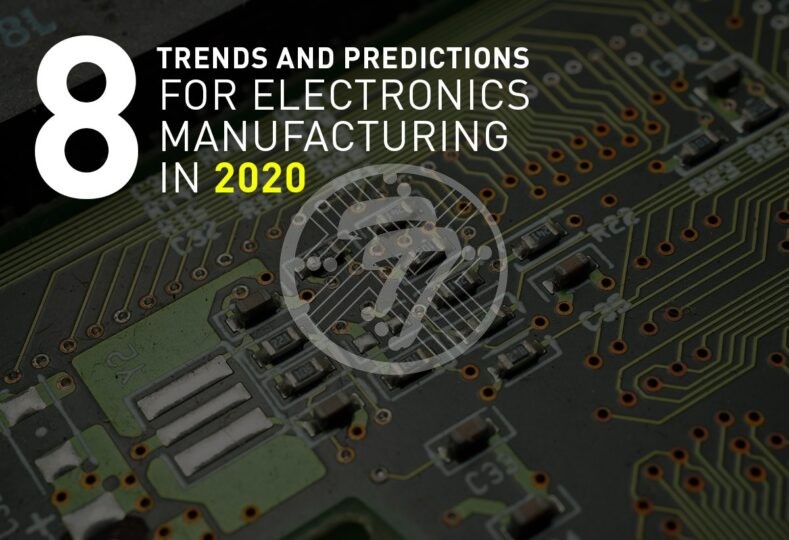Top 8 Trends and Predictions for Electronics Manufacturing Industry that will Reshape 2020!

To say that the electronics manufacturing industry has been undergoing a whole lot of disruption in the last few years, wouldn’t be an overstatement. These are indeed exciting times for the industry as a whole with the advent of new technology giving the impetus to ramp up operations and make them more intelligent.
Top 8 Electronics Manufacturing Industry Trends that are shaping the industry:
1. Internet of Things
The electronics manufacturing industry has been both embracing as well as leveraging Internet of Things. On account of embracing IoT, the industry has been benefiting in various ways, prominent among them being:
- A reduction in overall costs
- Marked improvement in product innovation
- Improved efficiency
- Better safety measures
With the availability of real time information, improved and efficient decision-making has also been made possible. Check out how to overcome the challenges of IOT with Smart PCB Manufacturing.
In fact, with further rise in cloud computing as well as improvements in connectivity, the global IoT spend is only slated to increase further.
2. Leveraging the Supply Chain
With a sharp focus on improving the overall brand experience, leveraging the entire value chain is going to be another major trend. This could manifest itself in a number of ways, including:
- Improved fulfillment time
- Improved supply chain visibility
- Improved sharing of information at different levels of the supply chain
- Improved control of distribution channels
- Reduction in costs
- Greater degree of flexibility
All of this will go a long way in improving the customer experience at multiple touch points.
3. Environmental Accountability
This trend isn’t unique to the electronics manufacturing industry alone as most businesses are now aware of the environmental impact of their offerings. However, the electronics manufacturing industry is being seen taking several measures. Some of these include:
- Greening of the factory floor
- Investing in alternate energy sources
- Reduction of waste emission
In fact, Electronics manufacturers are expected to closely look at their environmental impact at various stages of the product life cycle beginning with product design and ending with its storage, or even beyond, with its recyclability.
4. Customer Focus
As with a host of other industries, the electronics manufacturing industry will gain from its increased customer oriented approach. In fact, this trend will be further propelled by the use of IoT by ensuring a better understanding of the target consumer. This will ensure that the customer needs can be correctly mapped. Once this is done, customizing products to his requirements becomes a far easier job.
5. On-demand manufacturing
It follows from the above point that on-demand manufacturing will be another growing trend, with product personalization and customization being of prime importance. What this implies is that micro manufacturing will grow in size and delivering to the customer’s bespoke needs will be a focus area.
6. B2B2C
There is an increasing shift from B2B to B2B2C model that will enable the manufacturers to sell directly to consumers. This in turn will come with various advantages, prominent among them being:
- Increased profit margins
- Faster time to market
- Improved customer relationships
- Improved control in sales
To take advantage of these, the future will see electronics manufacturing companies further enhancing its e-commerce and logistics divisions.
7. Cobot workforce
The years to come will see an improved role played by cobots in the manufacturing process. In fact the collaborative robots market is estimated to reach £9.7 billion by 2025, as per as a Barclays Equity Research. In turn this will make automation of work processes quicker and more flexible. The added advantage of using cobots is also that they work well with fragile components as well as high-quality accessories.
8. VR & AR
Virtual Reality and Augmented Reality are also expected to play a strong role in the electronics manufacturing industry. The technology offers the ability to make accurate changes in the design phase itself so that costly errors in the production phase can be avoided. This also has its implication on efficiency as the time to make modifications is significantly reduced. The use of this technology also comes with reduced inspection time, which has positive implications both in terms of cost and quality.
Clearly then, going forward, as the demand for smart electronic devices continues to rise, the electronics manufacturing industry will focus on a number of different trends to ensure that it can meet and exceed customer requirements while also trying to control costs and being mindful of its environmental responsibilities.
Technotronix Electronics Manufacturing Service combines state-of-the-art technology with our advanced engineering to deliver unparalleled quality and service. Our defense, industrial, and medical customers gain a competitive edge with fast prototyping, domestic and off-shore manufacturing and the consistent delivery of high-quality, on-time, price-competitive products.
At Technotronix, we are fully equipped to handle your PCB manufacturing requirements. With over 4 decades of experience in PCB manufacturing as well as assembling PCBs with differing levels of complexities, we follow industry best practices to ensure we deliver cutting-edge products. Our team of experts and state-of-the-art equipment ensures that all our PCBs meet the industry standards of quality and testing. It is our vast portfolio of satisfied clients that stand as the biggest testimony to our success. In case if you have any questions, please feel free to contact us via email at sales@technotronix.us






